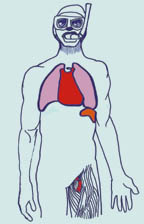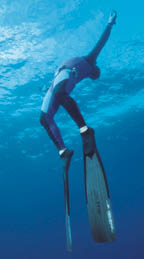
Freedive!
CHAPTER
EXCERPTS
|
 |
FREEDIVE!
by Terry Maas and David SipperlyPhysiology
part I

Illustration showing human adaptations to freediving.
As a freediver, your most important asset is your own body.
Treated with understanding and respect, your body will transport you to many wonderful
adventures underwater. On the other hand, if you ignore the basic rules of physiology or
fail to stay in shape, you may suffer serious injury-even death. Adding a dose of common
sense to the knowledge you gain from this chapter should help avoid calamity. Although at
times these two chapters may sound a bit morbid, keep in mind there are relatively few
freediving accidents.
Each dive must be perfect. Once you descend, you're committing yourself to a successful
journey back to the surface. Our job in Physiology-part 1 is to help you understand the
physiology of breath-holding and relate it to the inherent dangers of freediving. We'll
start by addressing the mechanics of respiration, the gases of respiration, the human
physiologic adaptations to breath-holding underwater and blackouts. In Physiology-part 2,
we'll examine the direct effects of water pressure on your body and gear. This chapter
ends with discussions of mental and physical stress, nutrition, heartburn and the effects
of temperature.
Respiration
Just as life begins and ends with a breath, so does a freedive. Breathing is such an
integral part of life that we take it for granted, but freedivers can't afford to take
such a casual approach to respiration.
Respiration is the exchange of gases-oxygen and carbon dioxide-between your lungs and the
cells of your body. As you take a breath of fresh air, it warms as it journeys through
your mouth and throat and into your lungs. In the lungs, air passes through an
ever-smaller network of tubes to end in tiny grape-like sacs called alveoli.........
> <@body text:> We’ve seen how oxygen is replenished at two
rates through both gaseous and metabolic pathways. The same is true with the other
important gas of respiration: carbon dioxide. If the dynamics of oxygen hint of
unpredictability, the dynamics of carbon dioxide are absolutely confounding (for everyone
except physiologists), especially in the face of exercise or hyperventilation. Carbon
dioxide is the primary waste gas produced by metabolism. The movement of carbon dioxide in
your body is slower than that of oxygen; it takes longer for carbon dioxide to reach
equilibrium between your tissues, blood and lungs. Without proper rest and breath control,
the two gases quickly become out-of-phase with each other. Unlike oxygen stores, which
always decrease during a dive, carbon dioxide levels may either rise after heavy exercise
or fall after hyperventilation...........

Freediver Blackout
You might think that shark attacks, line tangles and boat accidents are the freediver's
worst fears; in reality those risks pale in comparison to the death and destruction
wrought by diver blackout.
Blackout is the sudden loss of consciousness caused by oxygen starvation. Divers can
experience two types of blackout. Shallow-water blackout occurs when divers ascending
vertically in the water column undergo pressure changes. Static-apnea refers to blackout
that doesn't involve a deep dive; it's generally related to breath-hold attempts in a
shallow pool.............
When Terry researched the subject of shallow-water blackout for
BlueWater Hunting and Freediving, he was shocked to discover that most of the world's top
spearfishers had experienced close calls with shallow-water blackout.
Damiano Zannini, M.D. reports that approximately 70 percent of the Italian divers who
regularly compete in national and international spearfishing competitions have suffered
one or more blackouts. It's interesting to note that ama divers, with their history of
hundreds of years, experience a low rate of shallow-water blackout. They stick to a
conservative dive profile-they limit the duration of their dives to one minute and rest
between them. They also prefer to make many short dives instead of a few long ones.
The use of hyperventilation in preparation for freediving is controversial. No one
disagrees that prolonged hyperventilation, after minutes of vigorous breathing accompanied
by dizziness and tingling in the arms and legs, is dangerous. Some diving physicians
believe that any hyperventilation can be deadly because of its unpredictable effects from
person to person and from day to day. Other physicians, studying professional freedivers
such as the ama, found that they routinely hyperventilated mildly and took a deep breath
before descending. Their hyperventilation is very mild; they limit it by pursed-lip
breathing before a dive..................
|

